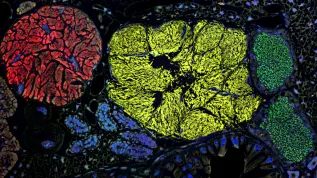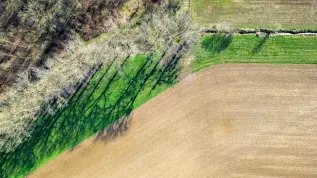
Long-term research is of great importance for natural sciences. Unfortunately, it is reluctantly financed because it does not fit into the model of science focused on quickly achieved and published results, says Grzegorz Neubauer, PhD.
Scientists are expected to carry out projects that will provide specific answers in a short time - a maximum of a few years. Meanwhile, long-term studies, also known as monitoring studies, require patience and systematic work, and the most valuable conclusions may appear only decades later. As a result, securing funds for their such research is difficult, and many studies can only be continued thanks to the determination of researchers.
In Biological Conservation (https://doi.org/10.1016/j.biocon.2025.111045), an international team of scientists summarized the results of many years of research conducted in the Białowieża Forest, emphasising its key importance for understanding the dynamics of ecological processes and the impact of climate change on natural forests. According to the authors in the face of ongoing environmental, social and geopolitical changes, conducting such research is associated with numerous challenges. In order to minimise the risk of their interruption and increase flexibility in obtaining funds, the focus should be on cooperation, including international cooperation, active participation of many scientists, building a sense of joint responsibility for the research and securing data deposited in shared databases.
'Long-term studies have been conducted in the Białowieża Forest for almost 90 years. They are of fundamental importance for understanding the changes occurring in forests and population dynamics. It is not only a matter of scientific curiosity, but above all the key to understanding and protecting natural ecosystems', says one of the authors of the publication, Grzegorz Neubauer, PhD, a professor at the Museum and Institute of Zoology of the Polish Academy of Sciences.
Ensuring their continuity is extremely difficult. Staff shortages, unfavourable procedures and emphasis on quick publications mean that funds for multi-year projects are basically not awarded.
'In today's world, there is a great emphasis on the pace of scientific research. Researchers are expected to carry out projects lasting a few years and publish results quickly. And natural cycles cannot be studied in this way. It often happens that only after a dozen or so years of observation do we notice patterns that would be impossible to capture in short-term projects. Unfortunately, the model of financing science does not take this into account', the expert points out.
He adds that the strict protection area in the Białowieża Forest National Park is one of the last, oldest and largest fragments of forest with natural features in the European Lowlands; a place almost undisturbed by human activity, unaffected by logging and artificial planting. Precisely such areas allow to observe natural processes, track the dynamics of populations and the mechanisms regulating their numbers. Conclusions drawn from long-term studies are the basis for creating effective programs to protect all forests and biodiversity.
'Without research in such places, we simply would not have a point of reference', Neubauer emphasises.
Together with a group of ornithologists, he has been continuing the Białowieża Forest bird monitoring programme initiated in 1975, thanks to which it was possible to determine, among other things, long-term trends in the populations of breeding birds and the dependence of breeding success on climatic conditions, the degree of fruiting of forest trees, food availability and the intensity of predation. 'Certain combinations of these factors occur rarely. In addition, without such long observations, we would not be able to notice, for example, regular population cycles of leaf-eating caterpillars, the basic food of birds in the Forest. Their gradations repeat every dozen or so years', the scientist says.
Several decades of research in the forest have also provided insight into how climate change affects the condition of the natural environment. 'The average spring temperature has increased here by almost 2 degrees Celsius over the last 50 years, which is more or less the same as everywhere else. This in turn has caused a shift in bird nesting dates and the gradual withdrawal of cold-loving species', he explains.
Climate change also affects the local vegetation. According to the researcher, in recent decades, spruce trees have been gradually withdrawing from the forest, being replaced by deciduous trees. The condition of the forest, and indirectly also of organisms dependent on humid habitats, is strongly influenced by factors such as lower groundwater levels and increasingly frequent droughts.
'This shows us how susceptible even the most natural ecosystems are to global changes', Neubauer emphasises.
He concludes that the Białowieża Forest is a unique model of resilience of long-term research, which continues despite numerous difficulties. Its scientific value cannot be overestimated, but the future is uncertain. In order for these studies to continue, stable financing mechanisms are needed, not just the determination of scientists.
PAP - Science in Poland, Katarzyna Czechowicz (PAP)
kap/ zan/ lm/













